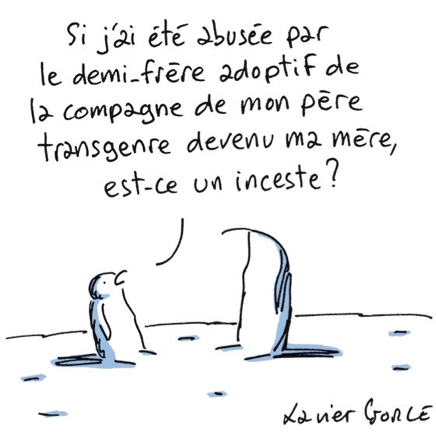From Cartooning for Peace.
 |
| If I was abused by the adoptive half-brother of my transgendered father's companion who became my mother, could we label it incest? |
Online controversy, public apology and resignation: the collaboration between cartoonist Xavier Gorce and the newspaper Le Monde comes to an end.
The cartoon refers to a society debate on incest following the publication of the book “La Familia grande”, in which lawyer Camille Kouchner accuses her stepfather, Olivier Duhamel, of having sexually assaulted her twin brother when he was a teenager in the late 1980s.
Faced with the reactions, the editorial director of Le Monde, Caroline Monnod, apologised to readers who might have been shocked by the publication, presenting the latest as a mistake made by the newspaper.
The next day, the cartoonist published an explanation of his cartoon on his Facebook page.
The next day, the cartoonist published an explanation of his cartoon on his Facebook page.
Responding to interviews for other newspapers, he expressed his surprise concerning the newspaper’s decision and worried about the weight of morality and social networks on the media.
 |
| Do you have your sanitized humor passport? |
After sketching his last cartoon for the newspaper on the same day, the cartoonist announced almost immediately that he would “stop working for Le Monde“.
The newspaper in turn responded to this decision with an update acknowledging this decision.
Several press articles and interviews about the controversy have followed since then.
Agreeing, like the two protagonists of the affair, on the fact that censorship is not a factor here (the cartoon is still visible on the newspaper’s website), Cartooning for Peace regrets the consequence of this umpteenth controversy caused by virulent reactions to the publication of a cartoon, which in just 48 hours brought to an end a 20-year collaboration between a cartoonist and a newspaper.
The situation demonstrates once again the growing pressure that online polemics put on cartoonists and the media that publish them.
And while ironically, the reactions once again prove the primordial role of this mode of expression, which reflects contemporary social debates, the association regrets that the polemic surrounding the nature of the cartoon, the presumed intention and the respective decisions of the author and the newspaper prevail over the fundamental debate the cartoon depicts.
Making the analysis of the press cartoon a pillar of its pedagogical method aimed fighting misunderstandings and intolerance, Cartooning for Peace regrets that the newspaper and the cartoonist were unable to respond to the controversy jointly.
And while ironically, the reactions once again prove the primordial role of this mode of expression, which reflects contemporary social debates, the association regrets that the polemic surrounding the nature of the cartoon, the presumed intention and the respective decisions of the author and the newspaper prevail over the fundamental debate the cartoon depicts.
Making the analysis of the press cartoon a pillar of its pedagogical method aimed fighting misunderstandings and intolerance, Cartooning for Peace regrets that the newspaper and the cartoonist were unable to respond to the controversy jointly.
An explanation putting the cartoon in perspective would have refocused the debate on the issue it deals with.
The press cartoon is a rich medium of information, awareness-raising and interpellation, which has all too often become hostage to a polarisation of opinions and its authors subject to considerable pressure from public opinion, particularly online.
The press cartoon is a rich medium of information, awareness-raising and interpellation, which has all too often become hostage to a polarisation of opinions and its authors subject to considerable pressure from public opinion, particularly online.
Faced with this growing phenomenon, Cartooning for Peace advocates for more pedagogy and will continue to contribute to the promotion and defence of the discipline.
Above all, it will continue to support readers, partners and cartoonist, relying on its educational approach.
And happy to have the opportunity to take over the role of Plantu on the front page of Le Monde newspaper, it will continue to promote the plurality of points of view of its network’s members on the news events.
And happy to have the opportunity to take over the role of Plantu on the front page of Le Monde newspaper, it will continue to promote the plurality of points of view of its network’s members on the news events.

No comments:
Post a Comment